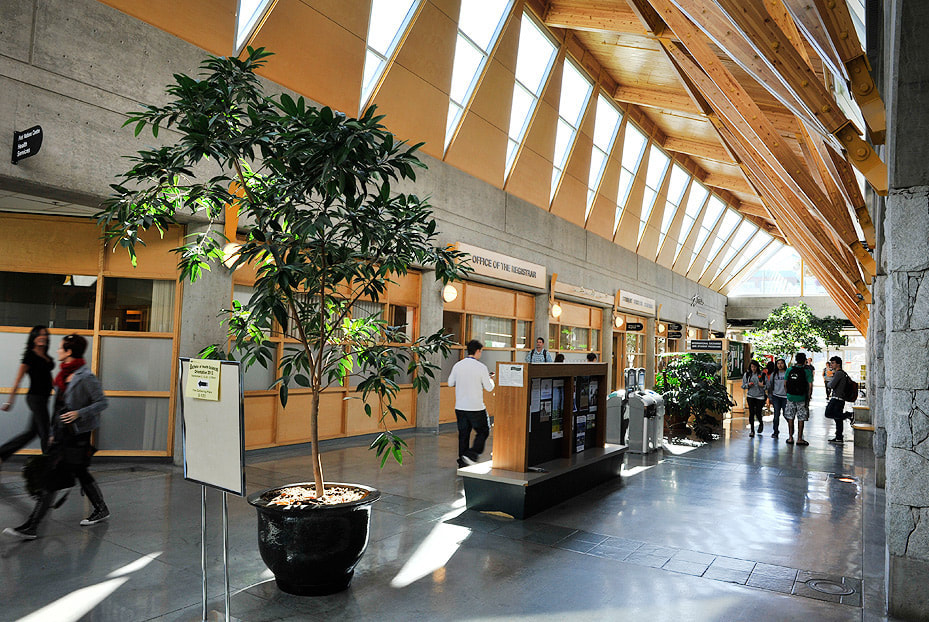โปรแกรม Bachelor of Arts in Global and International Studies
สถาบัน University of Northern British Columbia
About UNBC
University of Northern British Columbia (UNBC) เป็นมหาวิทยาลัยของรัฐตั้งอยู่ที่เมือง Prince George รัฐ British Columbia โดย UNBC ถือเป็นมหาวิทยาลัยชั้นนำที่ดีที่สุดแห่งหนึ่งของรัฐบริติชโคลัมเบีย โดยเปิดสอนโปรแกรมหลากหลายระดับ Certificates, Diplomas, Bachelors, Masters และ Doctoral degrees และในฐานะที่เป็นหนึ่งในมหาวิทยาลัยที่มุ่งเน้นในด้านการวิจัยของ BC สถาบันได้นำความรู้ใหม่ ๆ ทันต่อเหตุการณ์ ให้แก่นักเรียนทุกคน รวมทั้งผลการเรียนการสอน และงานวิจัยทั่วโลก นอกจากนี้ UNBC ยังเป็นสถานที่ที่น่าอยู่ ด้วยสภาพแวดล้อมที่เป็นมิตร เหมาะแก่การเรียนรู้
Why study at UNBC?
- ทีมอาจารย์มีความรู้และทรงคุณวุฒิในหลากหลายสาขา
- โปรแกรมที่เปิดสอนอันหลากหลายที่โดดเด่นจากสถาบันอื่น ๆ Field studies and adventures
- ห้องเรียนขนาดไม่ใหญ่จนเกินไป Small class sizes
- การเรียนที่เน้นภาคปฏิบัติ Experiential approach to education
- การเรียนรู้นอกห้องเรียน จากสิ่งแวดล้อมและธรรมชาติ
- นักเรียนในมหาวิทยาลัย active มีโอกาสให้เราได้ร่วมกิจกรรมมากมาย
- การทำ Applied class projects ช่วยให้นำความรู้มาใช้ได้จริง
About Global and International Studies (BA Program)
Our world is rapidly globalizing, bringing exciting opportunities and daunting challenges. Global and International Studies, hereafter referred to as Global Studies, seeks to tackle this brave new world in all its complexity. We train students to be global citizens, global thinkers, and global problem-solvers, and prepare them for global careers in academia, business, government, and the non-profit sector, among others. A unique feature of our program is that we train students in foreign languages. Language is the entry-point for understanding the world’s cultures and equips students for studying and working abroad.
Global Studies is a holistic and timely field of study whose scope is the whole Earth and whose eyes are on the future, aiding a global transformation toward healthy, just, peaceful, prosperous, and sustainable societies for all. The focus of our program is on the ‘big picture,’ international to global. Students emerge from our program with knowledge of the macro-level structures, actors, processes, ideas, issues, and events shaping our planet and its societies. This is accomplished in multi-disciplinary, multi-perspective, local-to-global, and critical ways of thinking.
The curriculum is organized around four themes:
- Global environment and sustainability
- Global cultures and diversity
- Global governance and social justice
- Global political economy and development.
Students take courses in each theme, learn to integrate across themes, and can focus on one or more themes if they so choose. Special attention is given to British Columbia’s immediate international neighbouring regions: Asia-Pacific, Circumpolar North, and the Americas.
Courses:
To give students a solid and well-rounded foundation in the social sciences and humanities, the IASK (Integrated Analytical Skills & Knowledge) program is integrated into the Global and International Studies major. In addition to IASK (which consists of 6 courses and 18 credit hours taken over two semesters), 63 credit hours of Global and International Studies coursework are required, of which 21 credit hours are at the lower-division (100/200) level, 30 credit hours are at the upper-division (300/400) level, and 12 credit hours are in foreign language study. Thus, a grand total of 81 credit hours is required for the Global and International Studies major.
The minimum requirement for completion of a Bachelor of Arts with a major in Global and International Studies is 120 credit hours.
Program Requirements Lower Division Requirement
100 and 200 Level
- INTS 100-3 Introduction to Global Studies
- INTS 210-3 Globalizations
Global environment and sustainability theme
- INTS 225-3 Global Environmental Challenge: Sustainability
Global cultures and diversity theme
- ANTH 213-3 Peoples and Cultures
Global governance and social justice theme
- POLS 202-3 Canada in Comparative Perspective
Global political economy and development theme
- ECON 101-3 Macroeconomics or INTS 220-3 Global Economic Shifts
Note: Students intending to take upper-division courses from the global political economy and/or global environment themes are strongly encouraged to take ECON 205-3 Statistics for the Social and Management Sciences in their first or second year.
Language and Regional Studies Requirement
Students majoring in Global and International Studies must complete four language courses (12 credit hours) and one lower-division regional studies course. The ideal sequence is to take all four language courses in a single language and a regional studies course corresponding to that language. This sequencing is not required; however, at least two courses must be in one language.
Regional Studies
One of:
- INTS 200-3 Contemporary Russia
- INTS 203-3 Contemporary Japan
- INTS 204-3 Contemporary China
- INTS 207-3 Contemporary Latin America
- INTS 240-3 Contemporary Circumpolar North
- GEOG 220-3 World Regions: Latin America and the Caribbean
- GEOG 222-3 World Regions: Russia
- HIST 281-3 Republican Latin America
International Languages
Note on Languages: Language courses offered by the Department of Global and International Studies are not designed for native speakers. A native speaker is defined as a person who is able to read and carry on conversations related to simple, daily topics or whose language ability is equivalent to a middle school graduate in that language. Students who have prior knowledge of the language for a given course must consult with the instructor, must complete a language skill evaluation, and must receive the permission of the instructor before being allowed to register for the course.
Chinese (Mandarin)
- INTS 161-3 Beginning Chinese I
- INTS 162-3 Beginning Chinese II
- INTS 261-3 Intermediate Chinese I
- INTS 262-3 Intermediate Chinese II
or
French
- INTS 171-3 Beginning French I
- INTS 172-3 Beginning French II
- INTS 271-3 Intermediate French I
- INTS 272-3 Intermediate French II
or
Japanese
- INTS 121-3 Beginning Japanese I
- INTS 122-3 Beginning Japanese II
- INTS 221-3 Intermediate Japanese I
- INTS 222-3 Intermediate Japanese II
- INTS 321-3 Japanese Conversation and Composition I
- INTS 322-3 Japanese Conversation and Composition II
or
Russian
- INTS 131-3 Beginning Russian I
- INTS 132-3 Beginning Russian II
- INTS 231-3 Intermediate Russian I
- INTS 232-3 Intermediate Russian II
or
Spanish
- INTS 181-3 Beginning Spanish I
- INTS 182-3 Beginning Spanish II
- INTS 281-3 Intermediate Spanish I
- INTS 282-3 Intermediate Spanish II
or
Other
- INTS 151-3 Beginning International Language I
- INTS 152-3 Beginning International Language II
- INTS 251-3 Intermediate International Language I
- INTS 252-3 Intermediate International Language II
Upper Division Requirement
300 and 400 Level
At the upper-division level, students must take INTS 310-3, INTS 490-3 (our 'global capstone' course), four INTS upper-division courses and four non-INTS upper-division courses.
INTS Upper Division Courses (18 credit hours)
- INTS 310-3 Origins and Evolution of Our Globalizing World
- INTS 490-3 Global Capstone
Non-INTS Upper Division Courses (12 credit hours)
Students must take four courses (12 credit hours) from the list of courses below. The courses are organized by Global Studies theme; however, students are not required to take a course in each theme. They are free to take any four courses of their choosing from this list.
Note: Some of these courses have prerequisites that are not met by INTS lower-division required courses. Students must ensure that all prerequisites are fulfilled prior to registering in any course.
Global environment and sustainability theme
- ANTH 312-3 Human Adaptability
- ANTH 413-(3-6) Environmental Anthropology
- ECON 305-3 Environmental Economics and Environmental Policy
- ECON 425-3 Trade and the Environment
- ENVS 306-3 Human Ecology
- ENVS 309-3 Gender and Environment
- ENVS 414-3 Environmental and Professional Ethics
- FNST 304-3 Indigenous Environmental Philosophy
- GEOG 305-3 Political Ecology: Environmental Knowledge and Decision-Making
- GEOG 307-3 Changing Arctic: Human and Environmental Systems
- GEOG 401-3 Tenure, Conflict and Resource Geography
- GEOG 420-3 Environmental Justice
- HIST 360-3 Introduction to Environmental History
- NORS 311-3 Lands and Environments of the Circumpolar North 1
- NORS 312-3 Lands and Environments of the Circumpolar North 2
- NREM 303-3 First Nations' Approaches to Resource Management
- NREM 306-3 Society, Policy and Administration
- NREM 411-3 Environmental and Professional Ethics
- ORTM 403-3 International Dimensions of Outdoor Recreation and Tourism
- POLS 344-3 Society, Policy and Administration of Natural Resources
Global cultures and diversity theme
- ANTH 305-3 Circumpolar Ethnography
- ANTH 404-3 Comparative Study of Indigenous Peoples of the World
- ANTH 414-3 Religion, Ideology, and Belief Systems
- ENGL 350-3 Comparative Literature
- ENGL 493-(3-6) Cultural Studies
- FNST 303-3 First Nations Religion and Philosophy
- FNST 416-3 International Perspective
- GEOG 301-3 Cultural Geography
- GEOG 403-3 First Nations and Indigenous Geographies
- GEOG 426-3 Geographies of Culture, Rights and Power
- HIST 390-3 Aboriginal People in Canada
- NORS 321-3 Peoples and Cultures of the Circumpolar World 1
- NORS 322-3 Peoples and Cultures of the Circumpolar World 2
- ORTM 306-3 Indigenous Tourism and Recreation
- POLS 412-3 Comparative Aboriginal State Relations
Global governance and social justice theme
- ANTH 406-3 Feminist Perspectives in Anthropology
- ANTH 410-3 Theory of Nation and State
- ANTH 419-3 Political and Legal Anthropology
- ANTH 420-3 Races, Racism, and Human Biology
- ECON 301-3 Women and the Economy
- ENGL 340-3 Postcolonial Literature
- ENGL 410-3 Contemporary Women's Literature
- ENGL 440-3 Special Topics in Postcolonial Literature I
- FNST 306-3 Indigenous Women: Perspectives
- HIST 311-3 History of Feminism
- HIST 312-3 An Introduction to the History of Gender
- HIST 340-3 Politics and Society in Twentieth Century China
- HIST 355-3 Russian Imperial History
- HIST 356-3 Soviet History
- HIST 380-3 Modern Mexico
- NORS 331-3 Contemporary Issues of the Circumpolar North 1
- NORS 332-3 Contemporary Issues of the Circumpolar North 2
- POLS 303-3 Democracy and Democratization
- POLS 309-3 Politics and Society in China
- POLS 370-3 Political Philosophy: Early Modernity to Post-Modernity
- POLS 372-3 Theories of Justice
- POLS 405-3 Special Topics in Political Science
- POLS 413-3 Democracy and Diversity
- POLS 414-3 Comparative Federalism
- POLS 427-3 Ethics and Public Affairs
- WMST 302-3 Women and the Contemporary World
- WMST 304-3 Contemporary Women's Writing in an International Frame
- WMST 306-3 Indigenous Women: Perspectives
- WMST 311-3 History of Feminism
- WMST 312-3 An Introduction to the History of Gender
Global political economy and development theme
- ANTH 415-3 Economic Anthropology
- COMM 303-3 Introduction to International Business
- COMM 432-3 Cross-cultural Workplace Practices
- COMM 441-3 International Marketing
- ECON 308-3 International Economic Relations
- ECON 321-3 Economics of Developing Countries
- ECON 404-3 Poverty, Inequality and Development
- GEOG 306-3 Critical Development Geographies
- POLS 415-3 Comparative Northern Development
Elective and Academic Breadth Requirement
Electives at any level in any subject sufficient to ensure completion of a minimum of 120 credit hours, including any additional credits necessary to meet the Academic Breadth requirement of the University.
Admission Requirements:
- TOEFL (Test of English as a Foreign Language) score of 90 or higher in the internet-based test, with not less than 20 in each of the Reading, Listening, Writing or Speaking components; Score of at least 230 in the computer based or at least 570 in the paper based test. UNBC’s institutional TOEFL code is 0320.
- IELTS (International English Language Testing System) Academic score of at least 6.5 overall, with not less than 6.0 in any of the four modules.
Contact Us
สนใจข้อมูลเพิ่มเติม สามารถสอบถามได้ที่ (085) 658-7000 (สาขากรุงเทพฯ) และ (778) 995-4763 (สาขาแวนคูเวอร์) ค่ะ


